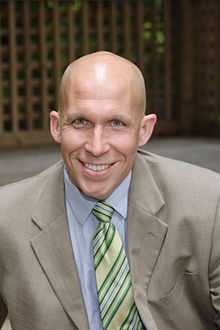Fund for the Public Interest
The Fund for the Public Interest (formerly known as the Fund for Public Interest Research and generally referred to as the FFPIR or "the Fund") is a 501(c)(4) non-profit organization that runs the public fundraising and membership operations canvassing for several political nonprofit organizations. The FFPIR name reflects its origins as the fundraising arm of the Public Interest Research Groups (PIRGs). Since the early 1980s, the Fund has also canvassed for other groups, including the Southern Utah Wilderness Alliance, the Sierra Club, and the Chesapeake Bay Foundation, among others, and continues to work closely with the state PIRGs, the Human Rights Campaign, Environment America, Environmental Action and Fair Share.
History
The Fund was created in the 1980s to raise money and build membership for the State PIRGs. The Fund is now one of the largest grassroots political fundraising networks in the country, running up to 70 field offices across the country.
FFPIR grew out of a MASSPIRG initiative campaign to pass the Bottle Bill where they first used door-to-door canvassing. The development of a membership and funding infrastructure independent of the campus chapters that had been until that time the center of the PIRG infrastructure reversed the decline in resources and influence that the PIRGs had been experiencing at that time, and initiated a shift in the PIRGs' organizational model that saw the previously campus-bound groups convert themselves into a mass-membership lobbying organization.[1]
Today, several groups use the Fund to support their door-to-door, street fundraising, telephone fundraising, voter education, visibility, and membership drives. The Fund's partner groups have grown significantly as well; for instance, more than half of the Sierra Club's current membership of 750,000 were recruited by the Fund.[2]
The Fund runs canvass offices, as well as other citizen engagement activities such as educating voters about issues, building the membership bases for grassroots groups, supporting grassroots advocacy (such as petition drives or letter-writing drives), and fundraising, in select locations around the country based on the needs of their partner organizations. Local directors hire canvassers to raise money for the Fund's partners and support its other campaign activities including media relations and coalition building. Fund canvassers can receive a base weekly wage as well as 25-35% of all the money they raise over the weekly quota. Until very recently, if the canvasser was unable to obtain the weekly quota, he or she was paid a fraction of the money they fundraised in lieu of the weekly wage. This often resulted in below minimum wage pay for the employee. The Fund has recently begun paying canvassers a guaranteed minimum wage and paid training day.
The Fund's campaign offices balloon in size (both in terms of the number of field offices and the number of canvassers per field office) during the summer months. The growth is largely due to hiring large numbers of college students for summer canvassing jobs.
Notable Alumni
Over the past several decades, many of the Fund's alumni have gone on to serve in key leadership positions at other nonprofit organizations or have held elected office. Below are just a few of the Fund's notable alumni:
Elected Officials: Mayor Eric Garcetti (Mayor of Los Angeles), Congressman Derek Kilmer (D-WA), Oregon State Representative Ben Unger, Maryland State Delegate Tom Hucker, Tom Perriello (former Virginia Congressman)
Progressive and Nonprofit Leaders: Phil Radford (Greenpeace),[3] Sarah Hodgdon (Sierra Club), Matt Baker (Hewlett Foundation), Carrie Doyle (Energy Foundation), Justin Ruben (MoveOn.org), Tom Subak (Planned Parenthood), Heather Smith (Rock the Vote)
-

Tom Hucker, Maryland State Delegate
-

Derek Kilmer, Congressman (D-WA)
-

Tom Perriello, former Virginia Congressman
-

Phil Radford, environmental, clean energy, democracy leader
Selected Accomplishments
The Fund started working with Environment Colorado in 2003. Today, Environment Colorado has over 25,000 members and has played a key part in several significant victories, including passing the nation’s first-ever ballot initiative mandating utilities use more clean, renewable energy like wind and solar power.
With the support of Fund staff for Environment California, the California Public Utilities Commission approved the California Solar Initiative (CSI) in January, 2006, committing a combined $3.2 billion in incentive funds to drive consumers toward solar power over the next 11 years. In August 2006, Gov. Schwarzenegger signed the Solar Homes Bill into law.
The Fund ran the Community Voters Project to register low-income minority voters for the 2004 and 2008 elections and registered nearly 400,000 new voters.
Criticism and Response
The book "Activism, Inc.: How the Outsourcing of Grassroots Campaigns Is Strangling Progressive Politics in America" by Columbia University sociologist Dana Fisher, is based on her study of a sample of Fund canvass offices during the summer of 2003. The Fund is the core of the study, and clearly identified even while masked in the book as the People's Project.[4] A website was created to respond to a few of the criticisms raised by the book,[5] and an article in the American Prospect was critical of Fisher's claims.
References
- ↑ Fisher, Dana, Activism, Inc.: How the Outsourcing of Grassroots Campaigns Is Strangling Progressive Politics in America (Stanford Univ. Press, 2006).
- ↑ Website: http://www.fundforthepublicinterest.org/partners/sierra-club
- ↑ "Phillip D. Radford, Greenpeace, Executive Director". Fund for the Public Interest. Retrieved 2013-07-19.
- ↑ Fisher, Dana, Activism, Inc. (above), p. 39 & nn. 7-8 & URL in n. 7; & see id., p. xii & n. 2.
- ↑ Canvassing Works
External links
- Fund for the Public Interest (official website)
- The Fund's Twitter Feed
- The Fund's Facebook page
- CanvassingWorks.org
- Environment America
- Environmental Action
- Human Rights Campaign
- U.S. PIRG
| ||||||||||